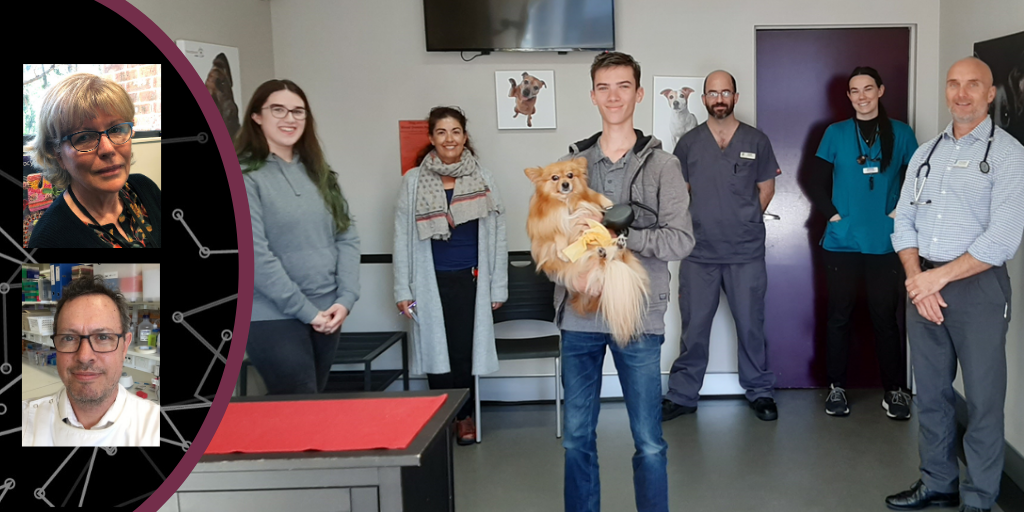
Left: CHIRI’s Associate Professor Delia Nelson and Stephen Proksch. Right: Happy family members Jade and Ryan with dog Paddy, whose tumour completely disappeared following treatment in the trial. Pictured with veterinary oncologist Dr Ken Wyatt (far right) and his colleagues Dr Sarah Mitchell, Geoff Daniels and Dr Eleanor Windle from the Perth Veterinary Specialists team.
A Curtin University dog cancer treatment trial led by Curtin Health Innovation Research Institute’s Associate Professor Delia Nelson, with long-time involvement from Research Associate Stephen Proksch (both from Curtin’s School of Pharmacy and Biomedical Sciences), has tails and chins wagging, raising hopes for a more effective immunotherapy treatment of an aggressive cancer that is also common in humans.
Curtin University and West Australian cancer immunology company Selvax Pty Ltd is working in cooperation with Perth Veterinary Specialists to conduct the trial, which has resulted in significant cure rates of dogs with soft tissue sarcomas in the first group of ten dogs tested.
Thirty per cent of the dogs treated in the first group showed complete remission from their cancers and none of the dogs treated showed any side effects from the Selvax therapy.
Even more promising is that the dogs were tested at the lowest of three dose levels of the treatment.
Pictured above is Paddy, whose tumour completely disappeared following his treatment in the trial.
Delia said the interim results of the trial strongly suggest that, with continued development, this treatment could have potential for the treatment of sarcomas in humans.
“Dogs develop similar sarcomas to humans and current treatment options have been limited, resulting in euthanising of a significant number of pets in the case of more advanced cancers,” Delia said.
“Sarcomas are also common and difficult to treat tumours in humans, with these aggressive cancers accounting for 20% of all cancers in children and 15% of cancers in adolescents and young adults.
“They can be fatal and for many sarcomas, outcomes haven’t improved significantly in over 40 years so to develop a more effective treatment of the disease would be a significant medical achievement.”
Delia is an immunologist whose research with CHIRI focuses on better understanding the immune system’s role in cancer. Her research explores how the immune system interacts with progressing solid tumours and on the use of immune, gene and vascular-based therapies to treat them.
Part of Delia’s research team, Stephen has been working on this particular project for six years. He is the key liaison between collaborators and contributes lab work including the preparation of treatments, processing, banking and analysis of tissue samples, and the compiling of data coming out of the project.
With CHIRI’s research focused on new treatments and therapies for diseases with ageing, Delia’s lab studies why our immune cells change as we age and whether they can be targeted to restore immune function in the elderly.
With the goal of this collaboration being to develop an effective and patient-friendly cancer immunology treatment for solid tumours in both dogs and humans, Delia is hopeful the team’s research will benefit both types of patients.